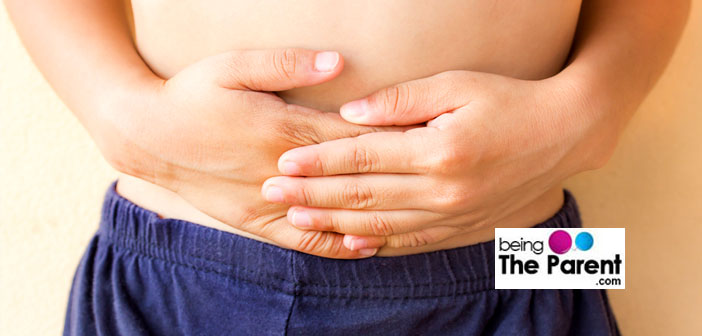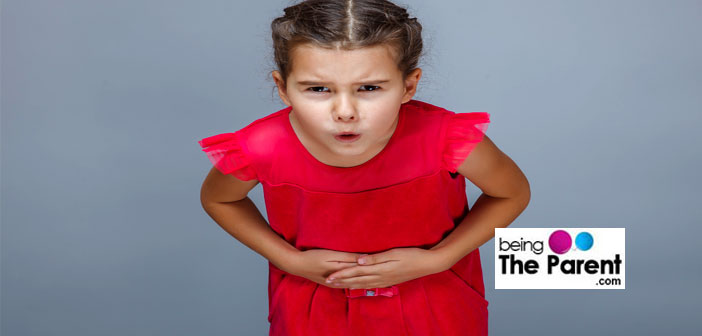
Irritable Bowel Syndrome In Children
5 min readWritten by Editorial Team

What Is Irritable Bowel Syndrome?
Irritable bowel syndrome (IBS) is a digestive disorder that can cause abdominal pain, excessive gas, bloating, diarrhea, constipation, and changes in bowel habits. This group of symptoms is associated with this gastro-intestinal (GI) disorder.
Normally, the muscle movement of the GI tract, along with enzymes and hormones released into the GI tract, allows the complete digestion of food. When the intestine gets irritated, the muscle movement is interrupted, and the contents of the colon cannot move smoothly. It kind of “stops and starts” or “doesn’t move or move fast.” This causes abdominal pain and discomfort for a child.

Gastro-intestinal tract does not get damaged. But the child with IBS has very sensitive bowel, and factors causing less discomfort in a normal child can cause severe pain for a child with IBS.
Is Irritable Bowel Syndrome A Disease?
IBS does not qualify as a disease but is a functional disorder as the bowel does not work as it should. Hence, IBS can’t be cured, but there are several advantageous methods of controlling and even abolishing IBS symptoms.
Is Irritable Bowel Syndrome Common Among Children?
IBS is more common among adults than in children, though irritable bowel syndrome can occur at any age. Recurrent abdominal pain is reported in 10% to 20% of children. But the proportion of IBS among these children is not differentiated. Another study conducted states that 5% to 12% of children develop IBS.
Is Irritable Bowel Syndrome Dangerous For My Child?
No, IBS is neither dangerous nor life-threatening. But the symptoms can be very painful and annoying, and the impact of IBS varies with each child. The sudden and strong muscle contraction that comes and goes frequently causes abdominal pain, which is intolerable for some children.
What are the causes of Irritable Bowel Syndrome in children?
- Stress: Emotional stress and anxiety are found to trigger the irritable bowel syndrome
- Genetics: Though it is not technically proved, IBS is more common among children whose family member possess a history of IBS
- Eating patterns: Unhealthy food and irregular eating habits are found to trigger IBS. If the child has undergone a previous episode of food-related illness, that can be connected to the development of IBS
- Brain- Intestine signaling problem:: The brain – intestine signaling problem or motor problem results in the movement of the digestive tract too fast or too slow. The slow motility leads to constipation, and fast motility leads to diarrhea. This accelerates the development of IBS
What Are The Symptoms Of Irritable Bowel Syndrome?
The symptoms usually show up after a meal.
- Abdominal pain can be continuous or occurs again and again. The pain can vary from mild to severe
- The pain is found to be aggravated by food intake and stress and will partially relieve after defecation
- Your child may experience bowels moving in different ways – sometimes moving, sometimes not moving. Diarrhea, constipation or fluctuation between the two are associated with the cramps
- The attack may strike anytime on day or night. Sometimes the child may wake up (not always) at night from the sound sleep due to attack
- The gas formed may feel trapped inside the stomach instead of passing it
- The child may feel like he is not done with the toilet
- Weight loss
- Abdominal bloating
- Passing mucus in the stools
How Is Irritable Bowel Syndrome Diagnosed?
IBS cannot be self-diagnosed. The process of diagnosing IBS in children is done through exclusion. There is no medical test to confirm IBM directly. So, the pediatric gastroenterologist will conduct various tests for other diseases that resemble the IBS symptoms. Important diseases that should be excluded before confirming IBS are:
- Intestinal parasites
- Food allergies
- Inflammatory bowel diseases
- Intolerances and malabsorptions
- Bowel obstructions
- Celiac which is an autoimmune disorder result in gluten intolerance
- Bacterial infections and SIBO (small intestine bacterial overgrowth)
When the result is negative, and the child experiences the abdominal pain and associated symptoms at least twice a week for a month or two without other disease or injury to explain the pain, IBS is diagnosed.

How Can The Irritable Bowel Syndrome In Children Be Treat?
Once the child is diagnosed with IBS, the goal of the treatment is to provide effective reduction and elimination of the symptoms. The pediatrician usually suggests family therapy if the symptoms are not much severe.
There is no cure for the IBS as it is a gastro-intestinal disorder rather than a disease. So, eliminating the discomfort that arises due to the symptoms is the practical solution. The combination of the following practices will help the child to relieve the discomfort.
Changes in eating habits and diet:
- Give the child small meals often rather than having a large meal
- Eat less spicy food
- Drink pure water
- Encourage the child to take meals that are low in fat and high in carbohydrates
- Keep a food diary for your child. This will help to track the food that triggers the attack and excludes it from the child’s menu
Children with IBS should limit or avoid the following food items
- Vegetables that cause gas such as cabbage, beans, etc.
- Dairy products like ice-creams and cheese
- Drinks with caffeine
- Chocolates
- Food with high-fat content
- Drinks with artificial sweeteners
Intake of fiber:
Dietary fiber will help to decrease constipation but not the pain due to IBS. The child should take the age+5gms of fiber daily. That is, a 10-year-old should take 15gms of fiber daily. Eating more than enough fiber can increase intestinal gas production and thereby increase the pain due to abdominal cramps
Medication:
Medication is suggested by the pediatrician when the child shows severe symptoms and when not respond to family therapy. Never take these medicines unless suggested by a pediatrician. Usual medications suggested are:
- Anti-diarrheal Medicines: This medication is given to reduce pain, blotting. This will reduce stool frequency. Stool consistency is improved by slowing down the movement of stool through the colon
- Antispasmodics: This medication is given to control the spasms of the colon muscles and thereby, reducing abdominal pain
- Laxatives: This medication is given to treat constipation
Probiotics:
This therapy with live microorganisms (usually bacteria) is similar to the microorganism found in the GI tract. This is found to improve the symptoms of IBS. Probiotics can be found in some food item like yogurt
Exercises:
Engaging the child in exercises and other extracurricular programs he wishes will help to keep the stress at bay. This will help in the improvement of his condition
What Measures Should Be Taken At School When A Child Is Diagnosed With Irritable Bowel Syndrome?
The child’s school should be informed about his condition. This will ensure the child’s immediate access to toilet facilities. This also will help to attract less attention, which will lessen his embarrassment.

Editorial Team,
With a rich experience in pregnancy and parenting, our team of experts create insightful, well-curated, and easy-to-read content for our to-be-parents and parents at all stages of parenting.Read more.
Responses (0)
Want curated content sharply tailored for your exact stage of parenting?
Sponsored content
Discover great local businesses around you for your kids.
Get regular updates, great recommendations and other right stuff at the right time.











